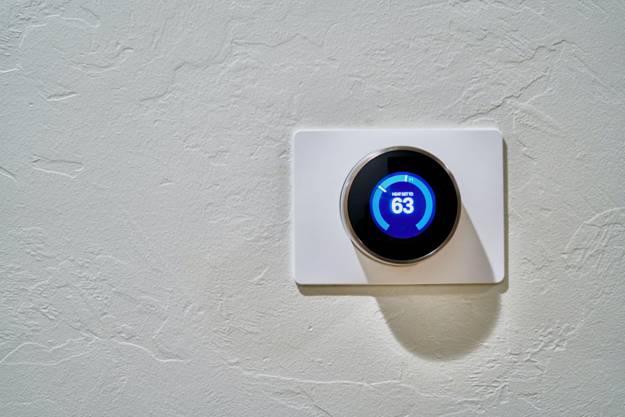Home energy solutions should be tailored specifically for each homeowner; what works for one may not fit another’s circumstance. Therefore, it is crucial that you find solutions tailored specifically to you and your home environment.
Green energy resources must not produce pollution.
1. Lower your thermostat
Lowering the thermostat is one of the easiest and most cost-effective ways for households to conserve electricity while simultaneously cutting carbon pollution.
The University of Utah recommends setting your thermostat between 68 degrees and below during winter and about 78 degrees during summer in order to conserve energy and save money.
Make sure that when leaving for extended periods, you setback your thermostat accordingly to further conserve energy. A programmable or smart thermostat makes this task simpler by automatically adjusting the temperature according to schedule – this practice is known as a thermostat setback.
2. Turn off unnecessary lights
People waste an enormous amount of energy by leaving lights on, especially in larger buildings. Although breaking this habit may be challenging, conserving electricity should always be prioritized.
Energy can be saved by switching out your current light bulbs for those that consume less power, such as CFLs and LEDs. You can visit this helpful site to learn more about CFLs. Furthermore, keeping bulbs and lamps clean increases efficiency and lengthens their lifespan.
3. Replace old appliances with new ones
Replacing old appliances with new ones can help save electricity. Older appliances often consume large amounts of power; newer models are typically designed to be energy efficient.
Furthermore, some retailers provide recycling programs whereby you can send in old devices for proper disposal. This is important because many areas have restrictions on how old appliances can be disposed of.
An effective way to conserve electricity is by signing up for green power, which consists of renewable sources like wind, solar, biogas, some forms of biomass, and low-impact small hydroelectricity. Use sites like bestestrøm.no to compare power companies. You can purchase green power either through your utility provider or independent providers; either way it reduces your carbon footprint and protects the environment.
4. Replace old windows with new ones
Old, leaky windows can let in cold winter air and hot summer heat, increasing energy bills exponentially. Installing energy-saving windows may help conserve electricity while saving money over time.
Window replacement contractors offer you an impressive range of energy-efficient and stylish window options, but for extra modern flair consider adding decorative window film. While traditional double pane windows may provide better insulation benefits than decorative film ones, decorative film may block sunlight more effectively while modernizing your home.
5. Reduce your water usage
Pumping water out of the ground, treating it, and transporting it requires energy-intensive processes that contribute to greenhouse gas emissions, so limiting water usage helps combat climate change.
Simple steps such as turning off the tap while brushing your teeth or waiting until your dishwasher and washing machine are fully loaded before starting them can save gallons of water every day. Furthermore, fixing leaky faucets or toilets could save even more water.
Regulating your water consumption also helps prevent wastewater from overflowing into local ecosystems and polluting the environment, something which is especially critical in drought-stricken areas. Even if your area has plenty of water available to it, limiting consumption can help preserve its supply for everyone!
6. Insulate your home
Insulating your home is one of the best ways to conserve electricity, as it prevents heat and cool air from escaping your house – leading to lower energy bills as well as less strain on heating systems and other appliances.
An adequately insulated home can save up to 15% more on heating and cooling costs; most homes waste 15-17% of their energy due to inadequate air sealing and insulation measures.
Insulating your home can not only lower energy consumption but can also make it more comfortable and quieter by blocking out noise pollution from neighbors, busy streets, and unwanted sounds. Furthermore, insulation helps prevent mold growth as well as dampness damage which helps improve your EPC rating and resale value over time – it makes an excellent long-term investment!
7. Use eco-friendly cleaning products
Green cleaning products contain natural, healthy ingredients that reduce off-gassing from traditional chemical cleaners that may irritate respiratory systems or trigger health conditions such as asthma and allergies. By opting for eco-friendly cleaners, you can limit exposure to toxic chemicals while simultaneously improving the health for yourself, your family members, and your pets.
Best of all – is it inexpensive and simple to make many of these products yourself?
Avoid waste by recycling and composting, growing your own food to reduce carbon emissions, take public transit whenever possible and drive less! There is always more you can do to help improve your carbon footprint.
8. Be smart about your air conditioning
Many people turn off their air conditioner when leaving for the day to save energy; however, this approach may end up costing more in the long run as it requires significantly more energy to bring the home back down to a comfortable temperature after having shut it off.
Setting the thermostat higher while away can also help decrease humidity levels in the home and prevent mold growth, making for an ideal way to protect your investment and ensure an easy return when you return from a day trip.
By increasing the temperature while you are away, your AC can use less energy to provide comfortable temperatures. Keep in mind that energy savings may vary depending on factors like climate, home insulation and type of AC system as well as whether or not a surge protector has been installed to guard against lightning strikes.
9. Turn off your computer when not in use
There has long been debate about whether it is better to shut off your computer when not in use, with some believing frequent shutdowns increase component wear-and-tear while others say leaving it on is equally detrimental.
An always-on computer will consume more energy, yet booting it back up often takes as long or more to boot-up than simply pressing “sleep.” Therefore, in many instances, it would be wiser to turn your PC off when not in use; saving both money and energy in this way.
10. Set your devices to timers
Instead of depending on family members to remember to switch devices off at certain times of day or week, set timers in order to conserve energy, save money, and extend bulb or appliance lifespan.
According to the Energy Efficiency and Conservation Authority (EECA), leaving lights on for several hours after you’ve finished using them costs an average household approximately $150 annually in electricity consumption costs. If left on all day long, however, those costs increase considerably.
Phantom energy (often called “vampire power”) draws electricity when an electronic device is left switched on or inactive for any length of time – this is especially prevalent among entertainment-related electronics like TVs, decoders, and gaming consoles. Unplugging can help reduce consumption, but for easier solutions consider smart plugs or power strips designated as standby savers.
Smart power strips will shut off devices when not in use, while smart plugs allow you to individually manage individual devices.
In addition to offering convenient energy-saving capabilities like auto shut-off capabilities and motion sensors, these plugs also include infrared technology for reducing latent energy consumption. By grouping devices together (such as home entertainment systems or kitchen appliances) onto one smart plug, you can ensure equal energy conservation measures across all your devices.
It is important for people to become good energy consumers; this means finding ways to conserve whenever possible. Utilizing these tips can help you save money on your electricity bill while you help save the environment.


